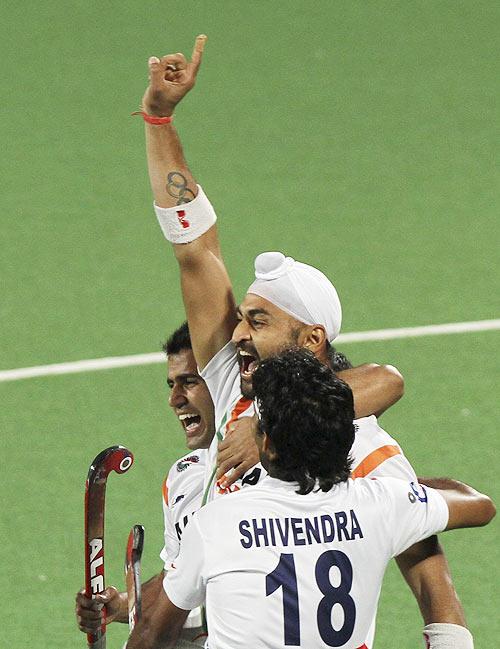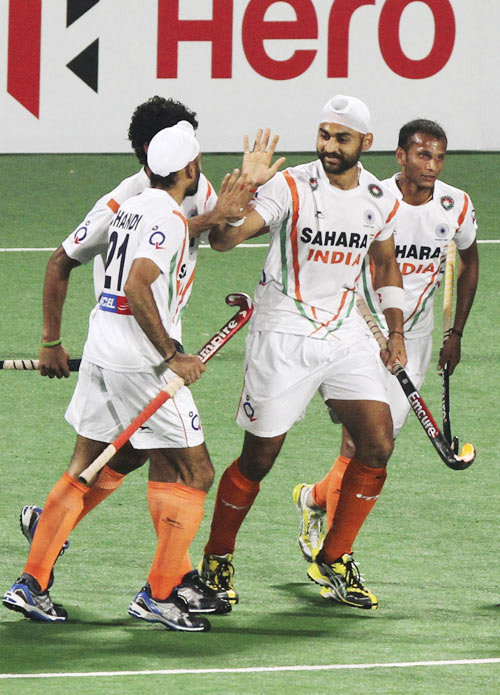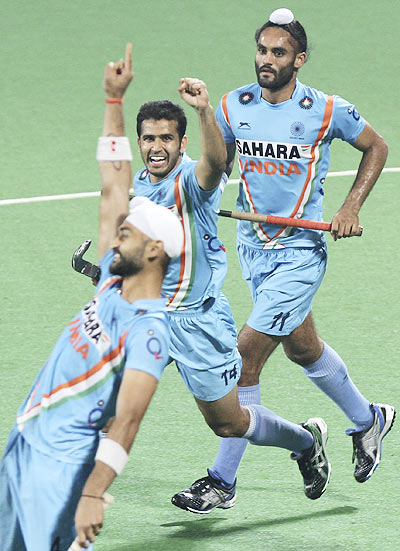Sandeep Singh is the toast of the nation after his exploits in the qualifying tournament for the 2012 London Olympics in Delhi.
Having suffered the heartbreak of losing in the qualifiers in 2008, which saw eight-time Olympic hockey champions India miss out on a berth at the Beijing Games for the first time in 80 years, he and his team were determined not to repeat past mistakes.
Leading the way was the 26-year-old full-back, scoring 16 goals, including a hat-trick. Sandeep played a starring role in the final against France, scoring five of India's eight goals.
The former captain did his reputation of a penaty-corner specialist no harm, considering all of his five goals in the final came from the set-piece drill.
The Ajuna awardee, part of the Indian squad in the 2004 Athens Olympics, hopes to make it count on this occasion. He, however, admits it won't be easy for India.
TWFcorrespondent Abhiroop Mukherjee meets up with the penalty-corner ace.
India is finally back in the Olympics. Can you tell how much pressure was there on the team this time to qualify?
I feel relaxed now after the team has qualified for the London Games. We are back to where we belong. The last eight years have been really tough. I along with Ignace Tirkey were the only two players who have the experience of playing in the Olympics.
So this time we were determined not to repeat the mistakes that we have done in the past. But the road from here will only get tougher.
'In international hockey, rankings don't matter'
Even before the qualifiers started, India were always the favourites. Did that take the pressure off from the players?
In international hockey, rankings don't matter. There were some quality teams, like Canada, Poland and France, in the tournament. But we have proved how we have come up strongly in the past couple of years. We dominated all the matches and that shows our strength.
What do you see the road ahead for the Indian team?
Things will only get tougher. The national camp is at the SAI in Bangalore. It will be crucial and help us to find out the areas where we have gone wrong during the qualifiers. Then we will have several international tournaments lined-up. We will take part in a test event in London and it will help us to acclimatize well before the Games.
Is the team buoyed by the glorious history of Indian hockey?
We have a bunch of young boys who have no experience of playing in the Olympics. They have realised that it will be of no use thinking about the glorious past of Indian hockey. If we think too much about the past we will take pressure. The boys want to live in the present and look forward.
'The Australian style is best suited for India'
How has the Indian team benefited from an Australian coach (Michael Nobbs)?
Both India and Australia have similar style of hockey. Today, Australia are the best in the world and having an Australian coach has helped us in learning the best practices of a champion team. The Australians have learnt the game from India. The Australian style is best suited for India. Both the countries play an aggressive and attractive game. I feel the Australian style will help us to go far rather than the European style of play.
Sixteen goals in a tournament is a great achievement. Can you tell us some thing about your drag-flicking skills?
I have spent long hours improving my drag-flicks. But penalty-corner is a team effort. It is a combination of the pusher, trapper and the drag-flicker. We have combined well in converting penalty-corners. I think since [former India player] Jugraj Singh (penalty-corner coach) joined the team our conversion rate have improved by 70 per cent.
How has Jugraj helped the Indian team?
Jugraj was a rare talent in Indian hockey. At the age of 20 he achieved stardom and was among the best drag-flickers in the world. His experience has helped us a lot. Jugraj tells us how to handle pressure situations. He has also worked hard on the variations that we are working on. He also gave us advice on how to stop penalty-corners.
'The game has been ignored for long'
This time lot of former players, including Dilip Tirkey, were involved with the team. How has this helped?
I think coach Nobbs has done a great job in getting some of the best supporting staff. All good teams in the world carefully pick their support staff. While Dilip has been helping the defenders, Mohammed Riaz worked with the forwards and Jugraj, the drag-flickers. It takes a considerable pressure off the coach's mind and he can focus on other areas.
The coach says despite being a defender you are in the team because of your drag-flicking skills. What about you defensive skills?
I am working hard on it. I know it is a problem. During the qualifying meet I had spent long hours working with Dilipbhai on improving my defensive skills. I am working hard on it and will surely improve.
Finally, there was a windfall for the hockey players?
It felt good. Finally, we feel that we belong to this place. The game has been ignored for long, but now I feel things are looking up. If we perform well then there will be a bright future for the game in the country.





Comment
article